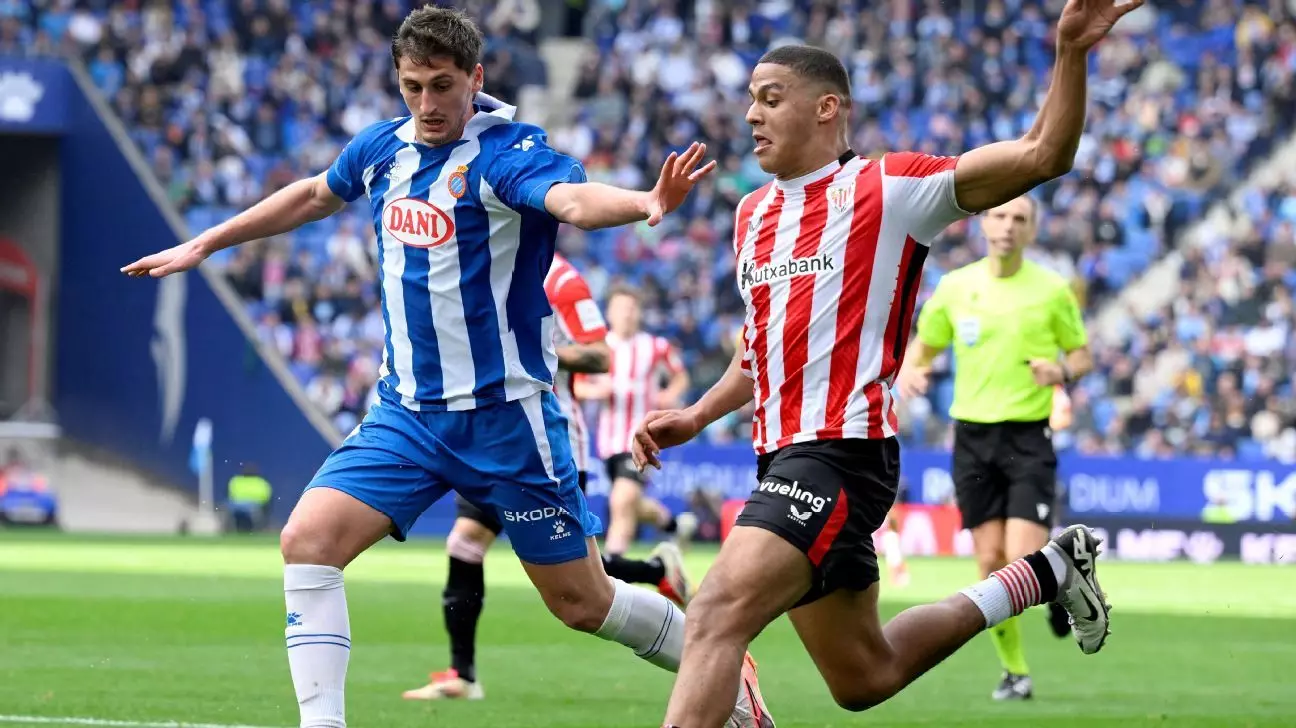The recent 1-1 draw between Espanyol and Athletic Club in LaLiga was overshadowed by serious allegations of racism directed at Maroan Sannadi, a forward for Athletic. This incident emphasizes a grim reality that has plagued football, particularly in Spain, where discriminatory behavior remains stubbornly present. The catalyzing moment came in the 17th minute when the game was halted, activating LaLiga’s anti-racism protocol. Such protocols are critical in sending a strong message against intolerance; however, their mere activation is a response to a problem that requires more preventive measures and community awareness.
Athletic forward Iñaki Williams, who initially alerted the referee, clarified that it was Sannadi who faced the brunt of the racist chants from the home crowd. Williams, himself a victim of racial abuse in past encounters, spoke out eloquently against the incident, underlining that moments like these detract from the joy of football and erode the sport’s integrity. His assertion that individuals’ abhorrent behavior should not tarnish the reputation of all Espanyol supporters introduces an important nuance: the need for collective action against racism within fan communities.
The Role of Referees and Protocol Enforcement
Referee Guillermo Cuadra Fernández’s immediate response by activating the anti-racism protocol demonstrated a commitment to addressing the situation proactively. As outlined in LaLiga’s guidelines, such incidents warrant a halt in play, accompanied by clear communication with the crowd. This protocol serves not just as a mechanism for dealing with issues as they arise, but also as a deterrent against future discrimination.
Despite the enforcement of these protocols, the frequency of racial incidents highlights a growing concern regarding their effectiveness. Quick but ultimately superficial responses can lead to a false sense of security for fans and players alike. If racism is to be effectively eradicated from football stadia, a more holistic approach is required—encompassing education, community engagement, and long-term strategies to modify societal attitudes toward race.
Historical context adds gravity to the current situation. Williams himself has faced racial abuse at the RCDE Stadium, and he is not alone. Other players, including Real Madrid’s Vinícius Júnior, have been subjected to racially charged insults, revealing a systemic issue within Spanish football culture. Recent penalties handed out to offenders, such as imprisonment for fans who abused Vinícius, indicate a possible shift toward accountability. However, isolated cases would not suffice in the larger battle against racism.
As the public and the sport’s governing bodies continue to grapple with these troubling dynamics, the need for consistent and unified responses is more apparent than ever. When Espanyol publicly condemned the racism, it added to the growing call among clubs to combat such behavior vehemently. Statements from clubs reinforcing a zero-tolerance policy should ideally translate into tangible initiatives that foster an inclusive atmosphere both on and off the field.
Unity is paramount in this fight. LaLiga, the Royal Spanish Football Federation (RFEF), and the clubs themselves must align their interests to create a culture of intolerance toward racism. This includes educational programs aimed at fans, ongoing workshops for referees and players to address their responsibilities in combating racism, and incentives for clubs that actively create a safe environment.
Furthermore, effective collaboration with community organizations can enhance the educational component, empowering fans to take a stand against racism. Fostering an environment where names and histories are shared can help to bridge gaps of misunderstanding among fans from varied backgrounds.
The Road Ahead
The incident during the Espanyol and Athletic Club match serves as a reminder that while some progress has been made, the journey towards eradicating racism from football is long and fraught with challenges. The collective voices of players, clubs, and fans must resonate loudly and clearly against such abuses. Moving forward, comprehensive strategies must be developed that not only punish abusers but also celebrate inclusiveness and diversity, reinforcing that social responsibility must echo in the very fabric of our beloved sport.

Leave a Reply